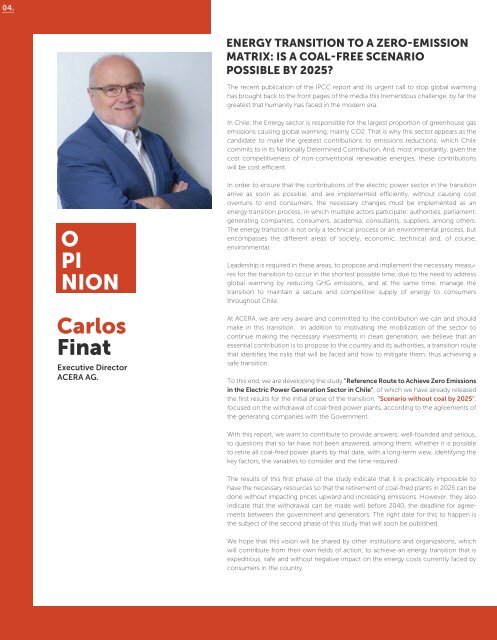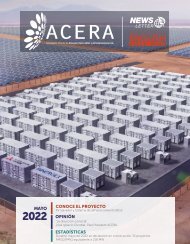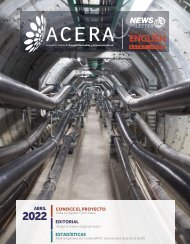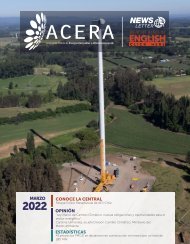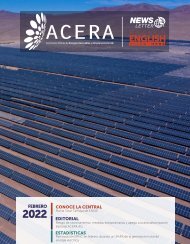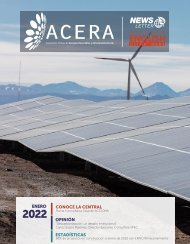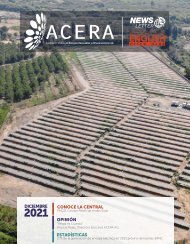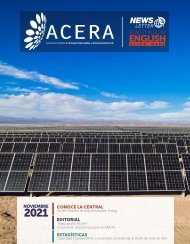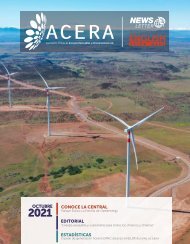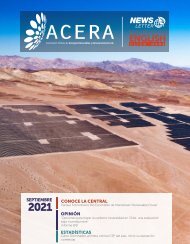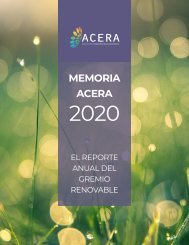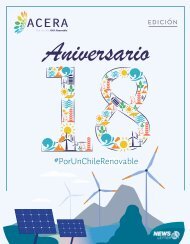Newsletter ACERA - Agosto 2021
Create successful ePaper yourself
Turn your PDF publications into a flip-book with our unique Google optimized e-Paper software.
04.<br />
POSSIBLE BY 2025?<br />
The recent publication of the IPCC report and its urgent call to stop global warming<br />
has brought back to the front pages of the media this tremendous challenge, by far the<br />
greatest that humanity has faced in the modern era.<br />
In Chile, the Energy sector is responsible for the largest proportion of greenhouse gas<br />
emissions causing global warming, mainly CO2. That is why this sector appears as the<br />
candidate to make the greatest contributions to emissions reductions, which Chile<br />
commits to in its Nationally Determined Contribution. And, most importantly, given the<br />
cost competitiveness of non-conventional renewable energies, these contributions<br />
will be cost efficient.<br />
O<br />
PI<br />
NION<br />
Carlos<br />
Finat<br />
Executive Director<br />
<strong>ACERA</strong> AG.<br />
In order to ensure that the contributions of the electric power sector in the transition<br />
arrive as soon as possible, and are implemented efficiently, without causing cost<br />
overruns to end consumers, the necessary changes must be implemented as an<br />
energy transition process, in which multiple actors participate: authorities, parliament,<br />
generating companies, consumers, academia, consultants, suppliers, among others.<br />
The energy transition is not only a technical process or an environmental process, but<br />
encompasses the different areas of society, economic, technical and, of course,<br />
environmental.<br />
Leadership is required in these areas, to propose and implement the necessary measures<br />
for the transition to occur in the shortest possible time, due to the need to address<br />
global warming by reducing GHG emissions, and at the same time, manage the<br />
transition to maintain a secure and competitive supply of energy to consumers<br />
throughout Chile.<br />
At <strong>ACERA</strong>, we are very aware and committed to the contribution we can and should<br />
make in this transition. In addition to motivating the mobilization of the sector to<br />
continue making the necessary investments in clean generation, we believe that an<br />
essential contribution is to propose to the country and its authorities, a transition route<br />
that identifies the risks that will be faced and how to mitigate them, thus achieving a<br />
safe transition.<br />
To this end, we are developing the study "Reference Route to Achieve Zero Emissions<br />
in the Electric Power Generation Sector in Chile", of which we have already released<br />
the first results for the initial phase of the transition, "Scenario without coal by 2025",<br />
focused on the withdrawal of coal-fired power plants, according to the agreements of<br />
the generating companies with the Government.<br />
With this report, we want to contribute to provide answers, well-founded and serious,<br />
to questions that so far have not been answered, among them, whether it is possible<br />
to retire all coal-fired power plants by that date, with a long-term view, identifying the<br />
key factors, the variables to consider and the time required.<br />
The results of this first phase of the study indicate that it is practically impossible to<br />
have the necessary resources so that the retirement of coal-fired plants in 2025 can be<br />
done without impacting prices upward and increasing emissions. However, they also<br />
indicate that the withdrawal can be made well before 2040, the deadline for agreements<br />
between the government and generators. The right date for this to happen is<br />
the subject of the second phase of this study that will soon be published.<br />
We hope that this vision will be shared by other institutions and organizations, which<br />
will contribute from their own fields of action, to achieve an energy transition that is<br />
expeditious, safe and without negative impact on the energy costs currently faced by<br />
consumers in the country.


